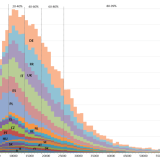
Funktionierende und inklusive Arbeitsmärkte
Gut funktionierende Arbeitsmärkte sind eine Voraussetzung für die volle Ausschöpfung der Möglichkeiten zur Schaffung von Arbeitsplätzen einer Volkswirtschaft, nachdem sie die Finanz- und Wirtschaftskrise überwunden hat. Die Krise hatte sehr unterschiedliche Folgen für die Arbeitsmärke in den EU-Mitgliedstaaten und manche Gruppen, wie etwa junge Menschen oder Menschen mit einem niedrigen Bildungsniveau, waren besonders stark betroffen. Der rasch voranschreitende Strukturwandel ist auch mit neuen Herausforderungen mit Blick auf einen möglichen Arbeitskräftemangel und ein Missverhältnis zwischen Qualifikationsangebot und -nachfrage in verschiedenen Sektoren und Regionen verbunden.
Das wichtigste Instrument der EU zur Förderung von Beschäftigung und sozialer Eingliederung ist der Europäische Sozialfonds – dieser trägt dazu bei, Menschen in Arbeit zu bringen, benachteiligte Menschen in die Gesellschaft zu integrieren sowie fairere Lebenschancen für alle sicherzustellen. Des Weiteren gelten umfangreiche europäische Rechtsvorschriften zur Regulierung der Rechte von Arbeitnehmern auf dem Arbeitsmarkt. Darüber hinaus hat die Europäische Kommission im April 2017 die europäische Säule sozialer Rechte ins Leben gerufen. Die Säule baut auf der EU-Sozial- und Beschäftigungspolitik auf und ergänzt diese, um als Richtschnur für die Politik in einer Reihe von Bereichen zu dienen, die für gut funktionierende und faire Arbeitsmärkte und Wohlfahrtsysteme von wesentlicher Bedeutung sind.
- Europäische Kommission: Europäischer Sozialfonds
- Europäische Kommission: Die europäische Säule sozialer Rechte




























